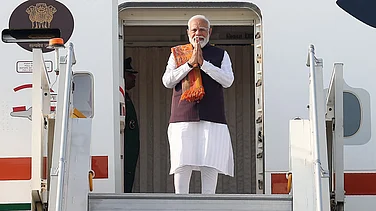Till yesterday the debate was why and how Indian Muslims are free from the contagious effect of the so-called jehad sweeping the Islamic world, having no concern, barring some in Kashmir, with the business of Al Qaeda, the ISI and terrorism. Indeed, in 2003 security expert B Raman wrote, "The overwhelming majority of Indian Muslims are loyal, law-abiding citizens. They have not allowed their anger against the Indian government or the Hindus for any reason to drive them into the arms of terrorist organisations. India has the most modern, peaceful and forward-looking Muslim community in the world."
More recently, Prime Minister Manmohan Singh boasted that not even a single Indian Muslim is on the rolls of Al Qaeda. For this relative freedom of Muslims from the jehad ideology we credited our democratic system, the Sufi ethos of Indian Islam and a culture that discouraged any kind of extremism in thought and action.
After a series of blasts ripping through different cities of India and its religious places, however, it is now clear that Indian Muslim youths, however small in number, are working in India as foot-soldiers of international terrorist organizations. They still may not be fighting with the ranks of Al Qaeda in Afghanistan, or in Iraq or Palestine, but doubtless some of them are colluding with the global jehadis in the latter’s mission to weaken and destabilise India.
It is estimated, for example, that at least 100 people participated in the execution of the July 11 Mumbai blasts. Without committed local Muslim support such a despicable act would not have been possible. Intelligence experts say that at least 25 Muslim organizations are working on Indian soil to breed alienation among the Indian Muslim youths and to suck them into the global whirl of jehad. And the response of the Muslim masses to these organizations is not that of complete apathy.
The collusion of local Muslims with the global jehadi enlarges the scope of the battle against terrorism. Because it is not just inimical to the existence of Indian state, and its stability, but also against the Muslim community itself, it becomes obligatory for every Muslim also to work actively to defeat this offensive. In a way, it is doubly perilous for the Muslims of India: first, as common citizens vulnerable to the risk of terrorist attacks and second, as a supposed culpable minority susceptible to majority communal backlash, prejudices, suspicion and harassment by security agencies. Because it is more sinister to the Muslim interest, they will have to contribute at two levels, as citizens of India and as fellow community members, located at a vantage point, to understand the psychology and motive of terrorists and to subvert their operations.
Till now the response of the Muslim intelligentsia, activists and the community in general to this challenge has been absolutely lukewarm to say the least. After every act of terrorism, they chose to, at most, issue a muted condemnation and express disapproval from their safe confines. When the ideology of terrorism has invaded Muslim homes and seminaries, and it is drawing legitimacy from the Islamic faith, such a response from the community is by no account adequate.
The Muslim community must take the extremists’ act more seriously because the consequences of terrorism on Indian soil, in a multi-religious society, are enormous. An act of terrorism, even one perpetrated by Kashmiri militants or the ISI, throws peace and communal harmony out of gear across the country. It makes a Muslim’s Indian-ness less credible in the eyes of many. A situation where boys born and brought up in UP and Bihar plant explosives in temples and trains would certainly script a terrible destiny for over 140 million Indian Muslims.
To eradicate this ideology, the Muslims need to make serious, perceptible and relentless efforts. Counter-terrorism requires a systematic plan of action to insulate the general youth and de-toxicate those infected with the ideology. The thinking Muslims will have to go out of the comforts of homes and offices and work in gullies, seminaries, mosques and other public places to acquaint common Muslims of the consequences of terrorist acts for the community. For every one SIMI-like organisation perverting the minds of youths, they will have to raise 10 organisations alerting Muslims to the dangers of such an ideology. They will have to espouse the duty which the Koran assigns to every Muslim: "You are the best community that has ever been brought into being for the sake of mankind. You enjoin what is right and fair and you forbid what is wrong and unfair (3:110)".
Terrorism is also a battle within the Muslim community; a battle between the life instinct of the many and the death wish of a handful of lunatics. A Muslim has reason to fight and win this battle for the good of many of his andher community, and for the the larger interest of India.
(Asif Jalal, an IPS officer, is SP, Lahaul-Spiti)






















